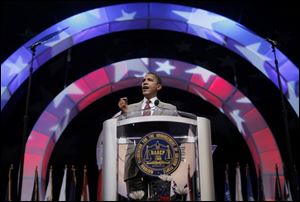
Obama urges blacks to accept responsibility for own lives
7/15/2008
Illinois Sen. Barack Obama tells NAACP delegates in Cincinnati that poverty threatens gains made during the civil rights era.
CINCINNATI - On the brink of history as the first black presidential nominee of a major party, Barack Obama last night recalled those who came before him in a speech before a largely black crowd that polls - and crowd reaction - suggest is already in his pocket.
The Illinois senator told the national convention of the NAACP that gains made by civil-rights leaders like Martin Luther King, Jr., will mean little if poverty and poor education prevent anyone, black or otherwise, from taking advantage of them.
And, he said, change from government and corporate America will accomplish little if black America doesn't accept responsibility, particularly when it comes to its youth.
"None of it will make any difference, at least not enough of a difference, if we don't seize at the same time more responsibility in our own lives," he said to cheers. "It's not an either-or proposition. It's a both-and proposition."
About 3,000 people crowded into the Duke Energy Convention Center ballroom where Mr. Obama spoke. An additional 1,400 or so listened in overflow quarters while thousands more watched on a television screen in nearby Fountain Square in downtown Cincinnati.
His opponent, likely Republican nominee John McCain, will speak there tomorrow.
While never forgetting his audience, Mr. Obama's comments often were not race-specific.
"When CEOs are making more in 10 minutes than the average worker earns in a year, and millions of families lose their homes due to unscrupulous lending, checked neither by a sense of corporate ethics or a vigilant government; when the dream of entering the middle class and staying there is fading for young people in our community, we have more work to do," he said.
"When a human being is denied a life of dignity and respect, no matter whether they live in Anacostia or Appalachia or a village in Africa; when people are trapped in extreme poverty we know how to curb or suffering from diseases we know how to prevent; when they're going without the medicines that they so desper-ately need, we have more work to do," he said. "That's what this election is all about."
As he has in many of his stump speeches, Mr. Obama called for responsibility - personal, governmental, and corporate. He called for expansion of health care, noting one in five African-Americans lacks it. He called for a middle-class tax cut and promised to improve schools.
And he took aim at his opponent.
"I understand that Senator McCain is going to be coming here in a couple of days and talking about education, and I'm glad to he's going to, because this has to be a bipartisan effort," he said. "But the fact is what he's offering amounts to too much of the same tired rhetoric about vouchers. We need to fix and improve our public schools, not throw our hands up and walk away from them."
The McCain campaign countered that Mr. Obama, a first-term senator, has never led bipartisan change for education.
"He has shown he can't stand up to the labor unions that support him and oppose the meaningful reforms we need in public education," campaign spokesman Tucker Bounds said. "Once again we see Barack Obama quick to assume, quick to attack, and fast with rhetoric that sugarcoats his underwhelming record."
Mr. McCain is likely to win some points simply by agreeing to speak tomorrow. President Bush declined the invitation to speak during his 2004 Republican re-election campaign, although he did speak in 2000 as a candidate and again in 2006 as president.
Mr. McCain has little to lose and perhaps everything to gain with his appearance. A poll of three key, swing state voters released June 18 by Connecticut's Quinnipiac University showed Mr. McCain barely in the game when it comes to black voters.
Of blacks likely to vote on Nov. 4, Mr. Obama had 95 percent support in Florida and Pennsylvania and 90 percent in Ohio. While the same poll showed Mr. Obama leading overall in all three states, he trails among whites in Ohio and Florida, making even a small percentage gain among black voters crucial for a McCain victory.
Regina C. Hill, NAACP regional coordinator for Alaska, Oregon, and Washington, was a Hillary Clinton supporter and is now in the Obama camp. But as the wife of a Navy man, there is one thing Mr. McCain could do that could change that - pick Mr. Bush's Secretary of State, Condoleezza Rice, as his running mate.
"A lot of people in the black community believe that Condoleezza Rice is an intelligent woman, and perhaps if she were behind a Republican candidate, it would give some good credibility and checks and balances," she said.
Contact Jim Provance at:
jprovance@theblade.com
or 614-221-0496.